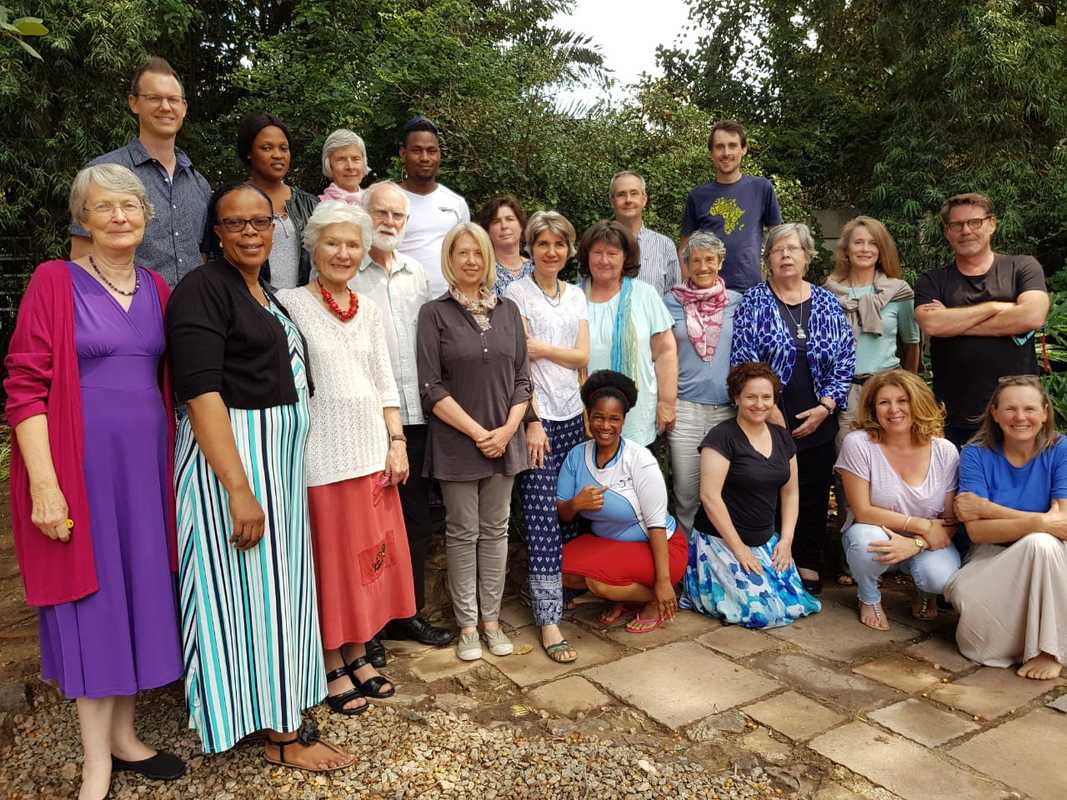Module 5: The 12 Senses
and a deeper understanding of vocational Work and the Sacrament of Ordination and Marriage
Review of Module 5 - "The 12 Senses and a deeper understanding of vocational Work and the Sacrament of Ordination and Marriage."
Alexander Higgins
Module 5 of the Africa Seminary took place from 19th to 21st October at The Christian Community in Johannesburg. It is so heartening to see that along with a solid core of participants who have managed to attend all the previous modules, the number of participants continues to grow. For Module 5, titled The 12 Senses and a deeper understanding of vocational work, the sacrament of Ordination and Marriage, there were 19 participants who were once again lead through the weekend by Michaël Merle and Reingard Knausenberger.
Module 5 of the Africa Seminary kicked off on Friday evening with an introductory lecture by Michaël Merle on Steiner’s 12 senses system. For those of us only familiar with the 5 senses and the occasional addition of a so called sixth sense it was an important grounding for the conversations, lectures and exercises that would pepper the rest of our weekend. Even the uninitiated could appreciate that in English, whether we believe in extra sensory perceptions or not, we use such terms as “a sense of humour”, “a sense of compassion” or “a sense of foreboding”, etc. We see here how cunningly linguistics hint at the innate presence of more sense abilities than those attributed to our physical sense organs.
Whether 12 or 6, our senses function as the doorway between our inner and outer lived experiences. They are the mediators of impressions, those we make on/in the world and those the world and the people around us make on us. Throughout the weekend we were challenged to engage with our senses through exercises designed to limit or enhance our senses, and to then reflect on the experiences. How and why am I able to draw something I cannot see? What is it in ourselves that seeks out balance when our eyes are closed? What is it that senses the Ego of the other? Where does our sense of safety and security come from? Do we need to taste to have a sense of taste?
Whether fully developed or not, by the time you are 21, your senses have gained their independence. You can differentiate, and feel the world through touch, keep healthy guided by a sense of wellbeing, navigate with our sense of movement, stand upright through our sense of balance, avoid the places with bad odours and the people with bad taste, see to gain insight, experience warmth, listen so that we actually hear, speak so that we are heard and how to choose our words, think a thought to the point where we are able to develop a concept and even gain a sense of intuition, and recognise that I am me, and you are an “I” also.
The twelve senses can be expressed as a linear journey from birth, through growth and eventually a sense of self. The sacraments enter this journey at key moments, affirming developmental milestones and reconnecting us to the greater meaning and purpose of our journey. Two sacraments stand apart from the rest. The Sacrament of Ordination and the Sacrament of Marriage. They do not rise to meet us as we develop. They appear when we seek them out. In both sacraments a question is asked that must be answered. The question can only be answered if you are a fully developed being with an ego. The question must be answered with a ‘yes’ or ‘no’. Both answers will define the stance of the ego. Both answers will ask of the individual ego how it wishes to integrate itself into a greater whole. Both sacraments begin a new social relationship. Social arithmetic dictates that 1 + 1 = 3. The 3 being that new space, an in-between space, that arises when we say “yes”. These two sacraments are laid out to develop new sense organs. To make us perceptive of those things that live in-between.
Module 5 of the Africa Seminary took place from 19th to 21st October at The Christian Community in Johannesburg. It is so heartening to see that along with a solid core of participants who have managed to attend all the previous modules, the number of participants continues to grow. For Module 5, titled The 12 Senses and a deeper understanding of vocational work, the sacrament of Ordination and Marriage, there were 19 participants who were once again lead through the weekend by Michaël Merle and Reingard Knausenberger.
Module 5 of the Africa Seminary kicked off on Friday evening with an introductory lecture by Michaël Merle on Steiner’s 12 senses system. For those of us only familiar with the 5 senses and the occasional addition of a so called sixth sense it was an important grounding for the conversations, lectures and exercises that would pepper the rest of our weekend. Even the uninitiated could appreciate that in English, whether we believe in extra sensory perceptions or not, we use such terms as “a sense of humour”, “a sense of compassion” or “a sense of foreboding”, etc. We see here how cunningly linguistics hint at the innate presence of more sense abilities than those attributed to our physical sense organs.
Whether 12 or 6, our senses function as the doorway between our inner and outer lived experiences. They are the mediators of impressions, those we make on/in the world and those the world and the people around us make on us. Throughout the weekend we were challenged to engage with our senses through exercises designed to limit or enhance our senses, and to then reflect on the experiences. How and why am I able to draw something I cannot see? What is it in ourselves that seeks out balance when our eyes are closed? What is it that senses the Ego of the other? Where does our sense of safety and security come from? Do we need to taste to have a sense of taste?
Whether fully developed or not, by the time you are 21, your senses have gained their independence. You can differentiate, and feel the world through touch, keep healthy guided by a sense of wellbeing, navigate with our sense of movement, stand upright through our sense of balance, avoid the places with bad odours and the people with bad taste, see to gain insight, experience warmth, listen so that we actually hear, speak so that we are heard and how to choose our words, think a thought to the point where we are able to develop a concept and even gain a sense of intuition, and recognise that I am me, and you are an “I” also.
The twelve senses can be expressed as a linear journey from birth, through growth and eventually a sense of self. The sacraments enter this journey at key moments, affirming developmental milestones and reconnecting us to the greater meaning and purpose of our journey. Two sacraments stand apart from the rest. The Sacrament of Ordination and the Sacrament of Marriage. They do not rise to meet us as we develop. They appear when we seek them out. In both sacraments a question is asked that must be answered. The question can only be answered if you are a fully developed being with an ego. The question must be answered with a ‘yes’ or ‘no’. Both answers will define the stance of the ego. Both answers will ask of the individual ego how it wishes to integrate itself into a greater whole. Both sacraments begin a new social relationship. Social arithmetic dictates that 1 + 1 = 3. The 3 being that new space, an in-between space, that arises when we say “yes”. These two sacraments are laid out to develop new sense organs. To make us perceptive of those things that live in-between.
Copyright © 2012 to 2024. | All rights reserved.



